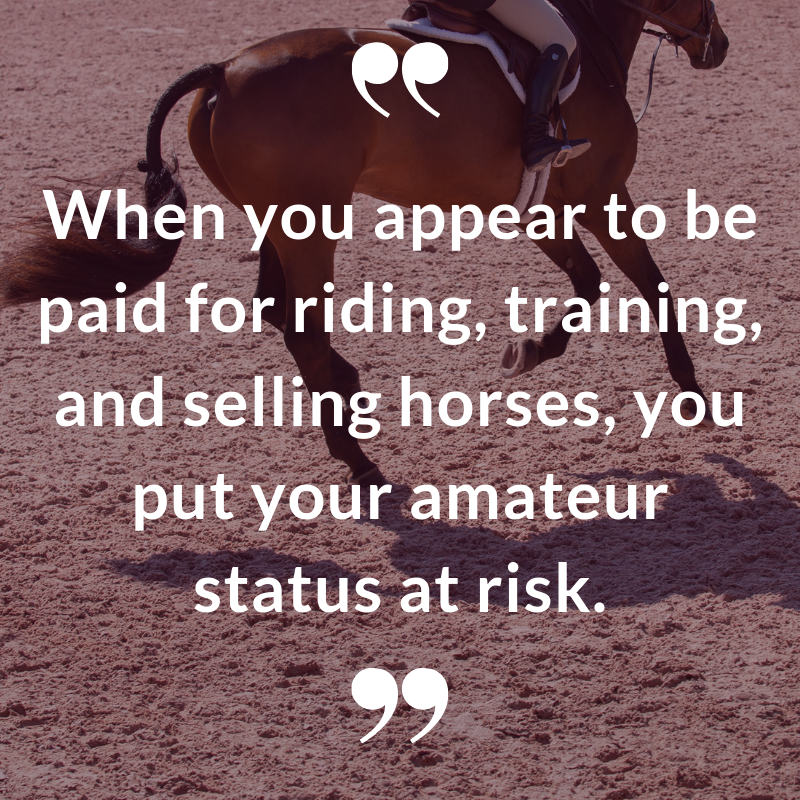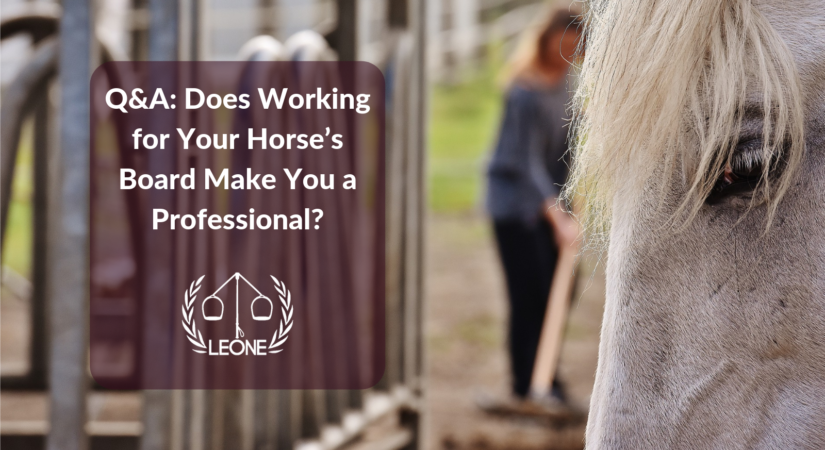Q: I just received notice that someone filed a U.S. Equestrian protest questioning my amateur status after they learned that I regularly hack horses for my trainer and help out around the barn in order to offset the cost of board for my horse. I’ve never received direct financial compensation for my work, and, skill-level wise, I’m very much an amateur rider, currently competing in the Low Adult Jumpers! I’m not at fault, correct?
A: You are not alone in your questioning of what disqualifies someone as an amateur in U.S. Equestrian competition; it can be a little bit of a gray area – particularly in situations like your own. Each situation is fact specific.
Unfortunately, I have to be the bearer of bad news. By receiving free or discounted board for your horse in exchange for hacking or exercising horses for your trainer or others, you are likely disqualifying yourself as an amateur.
 Within the U.S. Equestrian rule book, rule GR1306 (a.k.a. “the amateur rule”) defines the term “remuneration” as “compensation or payment in any form such as cash, goods, sponsorships, discounts or services; reimbursement of any expenses; trade or in-kind exchange of goods or services such as board or training.”
Within the U.S. Equestrian rule book, rule GR1306 (a.k.a. “the amateur rule”) defines the term “remuneration” as “compensation or payment in any form such as cash, goods, sponsorships, discounts or services; reimbursement of any expenses; trade or in-kind exchange of goods or services such as board or training.”
You’ll see board is specifically listed as a form of remuneration.
But wait! If you read a little further, you’ll also see the following:
“3. Permitted activities by Amateur. An Amateur is permitted to do the following:
- Accept remuneration for providing service in one’s capacity as a: clinic manager or organizer (so long as they are not performing the activities of instructor or trainer), presenter or panelist at a Federation licensed officials’ clinic, competition manager, competition secretary, judge, steward, technical delegate, course designer, announcer, TV commentator, veterinarian, groom, farrier, tack shop operator, breeder, or boarder, or horse transporter.”
So now you might be thinking that you’re fine, right? Maybe you’re thinking that most of what you do around the barn would fall into the same category as work done by a groom, so it’s not a conflict – and you would be correct. However, there is one part of what you explained that could be a potential problem: hacking horses. If you are just exercising horses and not training them, the hacking could be considered part of your grooming services. However, if you start training other people’s horses for your trainer or giving lessons, you will likely run afoul of the amateur rule.
Once you are over the age of 18, as soon as you begin receiving remuneration for any form of riding, you can no longer be considered an amateur by U.S. Equestrian rules. Section 4 of rule GR1306 states: “…a person is a professional if after his 18th birthday he does any of the following:
- Accepts remuneration AND rides, exercises, drives, shows, trains, assists in training, schools or conducts clinics or seminars.”
Section 4 could pose a problem, if your exercising is not considered part of your groom work and you are receiving remuneration for your riding. However, if you are not receiving remuneration for exercising horses at the barn, and hacking is an informal arrangement for your enjoyment and not part of your “job”, you may be able to ride barn horses and not be considered professional. Again, it all depends on the context. If you are exercising horses at a horse show, getting paid and not doing grooming work, you are likely going to be considered a professional.
Activities such as grooming, office paperwork, or barn maintenance work are permissible and do not affect your amateur status, so any arrangement with your trainer should specify that you are receiving remuneration in the form of reduced board for these activities..
The most important to keep in mind is that instructing even the youngest, most beginner riders at your barn or helping to train any of your other barn mates would again render you no longer an amateur. Even something as simple as walking a course at a horse show with a younger rider and providing them with input on how it should be ridden while your trainer is tied up at another ring could put you in violation of the rules. Again, the facts matter. Such a scenario could be fine were you not receiving remuneration from your trainer for this activity, because you are being compensated in the form of board for your horse, this sort of assistance to your trainer could be viewed as a violation.
You can review the amateur status rules in full here.
By being aware of the purpose and intent of the amateur rule, you can likely avoid running into problems with amateur status. When you appear to be paid for riding, training and selling horses, you put your amateur status at risk.

